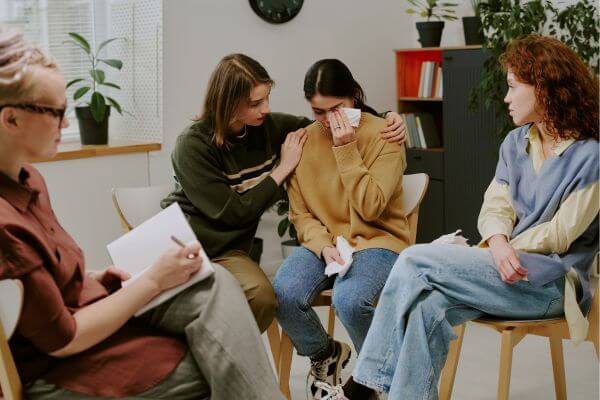
10 Oct What Are Emotional Triggers in Therapy and How to Work Through Them
Let’s be real for a second. Therapy isn’t always calm, peaceful chats with a cup of tea in hand. Sometimes you’re mid-sentence and—boom—you feel your chest tighten, or your throat close up, or you’re suddenly furious and don’t even know why. That, right there, is what people call a trigger.
And here’s the thing most people don’t realise: triggers aren’t signs that therapy is “going wrong.” If anything, they’re a sign you’ve hit something important. Like finding a bruise you didn’t even know was there until someone accidentally pressed on it.
What Emotional Triggers Actually Are
An emotional trigger is basically anything that lights up an old reaction. A word. A memory. A question your therapist asks that feels a little too close for comfort.
Sometimes the body speaks first: sweaty palms, heart racing, stomach in knots. Sometimes it’s emotions that burst in — anger, shame, sadness, panic. Other times it’s thoughts, like that nasty inner critic popping up or an old memory barging into your head uninvited.
And just to be clear: it’s not weakness. It’s your system saying, “we’ve been here before, and I don’t like it.”
Why Triggers Show Up in Therapy
Therapy is like lifting the rug to see what’s been swept under it for years. Of course dust flies everywhere.
Triggers happen because therapy pokes at old wounds — sometimes directly, sometimes by accident. A question might bring up a memory you thought you’d buried. Or maybe the way your therapist looks at you reminds you of someone from your past. Even a “safe” space can stir things up because your guard is finally down.
So if you’ve been blindsided by a big reaction in session, congratulations, you’re normal.
How Triggers Can Help You Heal
They’re uncomfortable, no doubt about it. But triggers are also doorways.
Walk through one with your therapist and you might discover where that reaction really began. You start seeing patterns — oh, that’s why I shut down in relationships, that’s why I get defensive when people criticise me.
Over time, working through triggers helps you:
- Understand your story more deeply.
- Practice calming yourself in the moment.
- Heal old grief or trauma.
- Break loops that keep repeating.
Painful, yes. Pointless, no.
What to Do When It Happens
If you feel a trigger coming on in session, don’t panic. There are a few simple things that make a difference:
- Say it out loud. Even just, “I’m feeling a lot right now.”
- Breathe and ground yourself. Wiggle your toes. Feel the chair under you.
- Be patient with yourself. You’re not weak for feeling this way — you’re human.
The key is not to run from it but to let it be part of the work.
The Therapist’s Role
A good therapist won’t judge you for being triggered. They’ll slow down, stay present, and help you find steady ground again. Often those exact moments — the ones that feel unbearable — turn into the biggest breakthroughs.
Triggers as Tools for Growth
So what are emotional triggers in therapy? They’re signals. Sometimes messy, sometimes overwhelming, but always pointing toward something worth looking at.
At Still Waters Psychology, we see triggers as part of the healing journey. They’re not obstacles, they’re stepping stones. Together, we’ll unpack them, learn from them, and use them to build resilience.
If you’re ready to stop fearing your triggers and start turning them into tools, book a session today.




No Comments